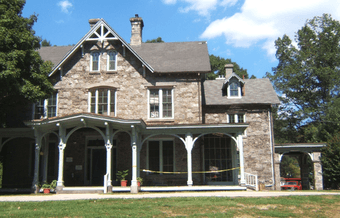Awbury Historic District facts for kids
|
Awbury Historic District
|
|

Francis Cope House
|
|
| Location | Roughly bounded by Chew Ave., Avonhoe Rd., Devon PL., Haines and Ardleigh Sts. and Arboretum boundary, Philadelphia, Pennsylvania |
|---|---|
| Area | 78 acres (32 ha) |
| Built | 1849 |
| Architect | multiple |
| Architectural style | Gothic Revival, Italian Villa, et al. |
| NRHP reference No. | 01000462 |
Quick facts for kids Significant dates |
|
| Added to NRHP | May 2, 2001 |
The Awbury Historic District is a special historical area in the East Germantown neighborhood of Philadelphia, Pennsylvania. It includes the old summer homes and farms of the Cope family. This family started moving to the area in 1849. The district also covers the entire Awbury Arboretum, which is a large garden and nature space.
The area is visually different from the busy city blocks around it. It features buildings designed in many cool styles. These include Gothic Revival, Italian Villa, Queen Anne, Tudor Revival, Shingle, and Colonial Revival. These buildings were built between 1849 and 1922.
This district was added to the National Register of Historic Places in 2001. This means it's recognized as an important historical place in the United States. In 2010, it was also added to the Philadelphia Register of Historic Places.
History of Awbury
The Awbury Historic District is in Philadelphia's East Germantown neighborhood. It holds the former summer homes and farms of the large Cope family. They began moving to this area in 1849. The district also includes the Awbury Arboretum, which takes up most of the area.
Some properties here were developed by Henry Cope (1793-1865). He was the son of Thomas Pym Cope (1768-1854), a well-known merchant and Quaker from Philadelphia. The buildings in the district show many different architectural styles. These include Gothic Revival, Italian Villa, Queen Anne, Tudor Revival, Shingle, and Colonial Revival.
The beautiful grounds of the Awbury Arboretum were designed by William Saunders. He was a famous landscape architect. He also designed the Gettysburg National Cemetery. He even helped design Fairmount Park in Philadelphia. A Victorian-style garden was also created near the Francis Cope House. This was a team effort by the Philadelphia Garden Club and the Weeders Garden Club.
Becoming a Historic Place
In August 2000, news came out that the Awbury Arboretum wanted to make the Awbury Historic District official. They submitted paperwork to get it listed on the National Register of Historic Places. This register lists places important to American history.
Pennsylvania's Historic Preservation Board reviewed the paperwork. They met in March 2001 to decide. The district was officially added to the National Register in May 2001. To celebrate, they held a day of free activities for the public. People could take tours of some of the district's most important homes.
The district was also added to the Philadelphia Register of Historic Places in 2010. This gives it special protection within the city.
Important Buildings in the District
The Awbury Historic District has 31 important buildings. These are called "contributing properties" because they help make the district special. They include 24 homes and other buildings.
Some of these notable properties are:
- Awbury Arboretum
- Francis Cope House (built in 1860)
- Jonathan & Rachel Cope Evans House (built in 1872)
- Alexis T. & Elizabeth Cope House (built in 1882-1883)
- Cope/Evans Double Houses (built in 1885-1886)
- William Draper Lewis House (around 1892-1893)
- Alfred G. & Mary Scattergood house (built in 1909)
- William C. Kimber house (built in 1914)
- Shippen & Esther Lewis house (built in 1921)
 | Percy Lavon Julian |
 | Katherine Johnson |
 | George Washington Carver |
 | Annie Easley |




